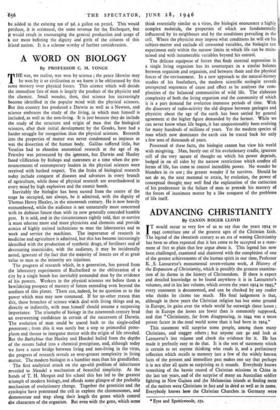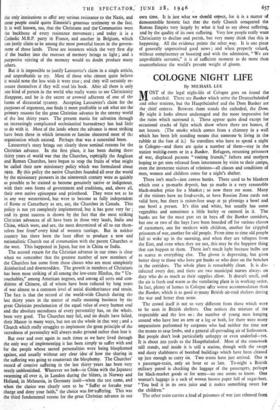ADVANCING CHRISTIANITY
By CANON ROGER LLOYD
IT would occur to very few of us to say that the years 1914 to 1945 constitute one of the greatest ages of the Christian faith. The legend of the twentieth century as an era of waning Christianity has been so often repeated that it has come to be accepted as a state- ment of fact so plain that few argue about it. This legend has now been challenged, examined and shattered with the completion of one of the greater achievements of the human spirit in our time, Professor K. .S. Latourette's monumental seven-volume work, A History of the Expansion of Christianity, which is possibly the greatest examina- tion of its theme in the history of Christendom. If there is expert and detailed knowledge to be found anywhere it is in Latourette's volumes, and in his last volume, which covers the years 1914 to 1945,* every statement is documented, and can be checked by any reader who thinks he claims too much. His final judgement is that, although in these years the Christian religion has lost some ground in Europe, its gains over the whole world far outweigh those losses ; that in Europe the losses are fewer than is commonly supposed, and that " Christianity, far from disappearing, in 1944 was a more potent factor in the total world scene than it had been in 1914."
This statement will surprise some people, among them many Christians, and stagger others ; but anyone can go and look at Latourette's last volume and check the evidence for it. He has made it perfectly easy to do that. It is the sort of statement which is certain to set anyone thinking who reads it, and a preliminary reflection which recalls to memory just a few of the widely known facts of the present and immediate past makes one say that perhaps it is not after all quite so surprising as it sounds. Everybody knows something of the heroic record of Christian missions in China in the last ten years, and of the surprise of many an Australian soldier fighting in New Guinea and the Melanesian islands at finding most of the natives were Christians in fact and in died as well as in name. Everybody knows how the Christian Churches. in Germany were • Eyre and Spottiswoode, 25s. the only institutions to offer any serious resistance-to the Nazis, and most people could quote Einstein's generous testimony to the fact.
It is well known, too, that the Christians and the•Communists were the backbone of every resistance movement ; and today it is a Catholic M.R.P. party in France, and another in Belgium, which can justly claim to be among the most powerful forces in the govern- ment of those lands. These are instances which the very first dip of the bucket into the recesses of memory brings to light; and a purposive stirring of the memory would no doubt produce many others.
But it is impossible to justify Latourette's claim in a single article, and unprofitable to try. Most of those who annot quite believe it would none the less wish it were true ; and they will certainly re- assure themselves if they will read his book. After all there is only one kind of person in the world who really wants to see Christianity disappear, and he• is the secret or avowed adherent of one of the forms of dictatorial tyranny. Accepting Latotikette's claim for the purposes of argument, one finds it more profitable to ask what are the primary reasons for the great Christian advance In the stormy world of the last thirty years. The present mania for salvation through an increasingly complicated ecclesiastical bureader•acy has had little to do with it. Most of the lands where the advance is most striking have been those in which invasion or famine shattered most of the organisation which existed. Perhaps that was a concealed boon.
Latourette's story brings out clearly three seminal reasons for the Christian advance. In the first place, it has been during these thirty years of world war that the Churches, espieci#Ily .the Anglican and Rioman Churches, have begun to reap the fruits of what might be called their new missionary policy which was formulated about 191o. By this policy the native Churches founded all over the world by the missionary pioneers in the nineteenth century were as quickly as possible to be trained to become genuinely native or indigenous, with their own forms of government and traditions, and, above all, their own native episcopate and priesthood. They were not to be in any way westernised, but were to become as fully independent of Rome or Canterbury as are, say, the Churches in Canada. This policy is not yet completely implemented, but it has gone very far ; and its great success is shown by the fact that the most striking Christian advances of all have been in those very lands, India and China, which were, and are, the most determined of all to cut them- selves free from• every kind of western tutelage. But in neither country has there been the least effort to produce a new and nationalistic Church out of communion with the parent Churches of the west. This happened in Japan, but not in China or India.
The second reason for the Christian advance in our times is clear when we remember that the greatest number of new members of the Churches has come from those classes who are most completely disinherited and downtrodden. The growth in numbers of Christians has been most striking of all among the low-caste Hindus, the " Un- touchables," among American negroes, and among all sorts and con- ditions of Chinese, all of whom have been reduced by long years of war almost to a common level of social disinheritance and strain.
The fact is that the record of the world-wide Church during the last thirty years in the matter of really meaning business by the great Christian proclamation of the equal value of every human soul
and the absolute sacredness of every personality has, on the whole, been very good. The Churches may fail, and no doubt have failed, their Master in many ways, but not on the whole in that way ; and a Church which really struggles to implement the great principle of the sacredness of personality will always make ground rather than lose it.
But over and over again in such times as we have lived through the only way of implementing it has been simply to suffer with and for the people whose sacred personalities were being blasphemed against, and usually without any clear idea' of how the sharing in the suffering was going to counteract the blasphemy. The Churches' record of creative suffering in the last thiny'years bas been very nearly_unblemished. Wherever we look—in China with the Japanese swarming all over it, in London during the blitzes, in Norway and Holland, in Melanesia, in Germany itself—when the test came, and • when the choice was clearly seen to be " Suffer or forsake your charge and deny your faith," the choice was ferri suffering. This was the third fundamental reason for the great Christian advance in our own time. It is just what we should expect, for it is a matter of demonstrable historic fact that the early Church conquered the Roman Eriapire very largely by what it had to say about suffering, and by the quality of its own suffering. Very few people really want Christianity to decline and perish, but very many think that this is happening. All the evidence points the other way. It is one piece of generally unperceived good news ; and when properly valued, without complacency or boasting and with the admission, " We are unprofitkble servants," it is of sufficient moment to do more than counterbalance the world's present weight of gloom.































 Previous page
Previous page